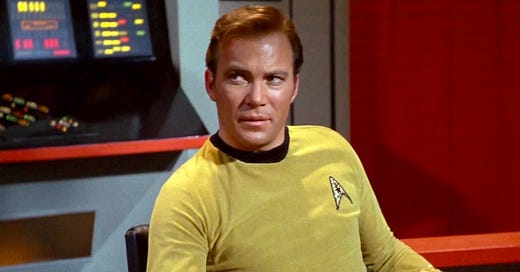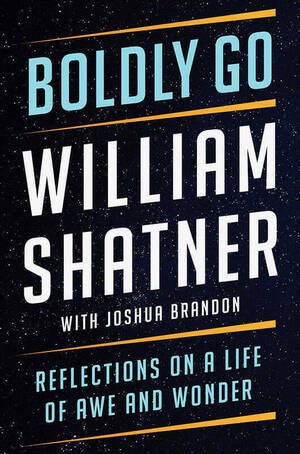William Shatner and John Lennon—Separated at Birth?
The steely Star Trek captain—in real life—also believes in love, love, love.
A version of my essay on William Shatner’s autobiography Boldly Go originally appeared in Notre Dame Magazine.
Movie star William Shatner was born in Montreal, Canada, nearly a century ago, and he had an unhappy childhood. “I did not feel the love I needed when I was growing up,” he writes in his autobiography Boldly Go: Reflections on a Life of Awe and Wonder.
Shatner, 91, best known as Star Trek’s Captain Kirk, recounts a story about another 60’s icon—a young John Lennon. When asked by his teacher, “What do you want to be when you grow up?” the cheeky lad replied, “Happy.” Shatner says “the teacher told him he hadn’t understood the assignment; according to Lennon, he replied that the teacher didn’t understand life.”
Like millions of other little boys in the 1960s, I grew up watching both men. They seemed literally light-years apart. One played a fearless warship captain who battled otherworldly menaces. One week he wrestled a preposterous eight-foot-tall green space lizard. In the next episode his foes might be Klingons, stand-ins for the Russians in the show’s thinly veiled Cold War conflict-in-the-stars. Then there was Lennon—Mr. All You Need is Love.
What a surprise it is to find 50 years later that Shatner, who is Jewish, and Lennon, who was apparently an atheist, are spiritual twins in love with life and its possibilities. “Open your eyes, your ears, your mind, and you’ll quickly be overcome by the wonder that surrounds us,” writes Shatner. “We should always be climbing for ideas, scaling the metaphorical mountains to reach greater heights. Every age should bring us to a higher level of consciousness.” Far out.
No wonder that Shatner has recorded eight albums that “marry spoken-word lyrics, experimental concepts, sound effects, and lush music.” His latest has the humble title “Bill.” His first album 1968’s “The Transformed Man” was a disaster. Quickly remaindered, a copy found its way to a North Carolina yard sale and into into the hands of teenager who was enamored by Shatner’s chutzpah.
The teen grew up to become acclaimed singer-songwriter Ben Folds, and the duo have recorded and performed together. At the end of one show, Shatner writes “I threw caution to the wind, and we rocked out with ‘Lucy in the Sky with Diamonds’….The crowd went bananas.” The experience was “one of the highlights” of his life. Surely somewhere in the psychedelic sky John Lennon smiles.
Love of life keeps Shatner going. The man is a glutton for experiences. He went swimming with sharks. He did stunt work atop a moving train. He rode a motorcycle cross country and back. He performed acrobatics in a stunt plane. (“Danger was my middle name, he writes, “but death and injury weren’t in my vocabulary.”) He almost got killed white water kayaking, and he took down a 10-foot-tall 1,500-pound Kodiak bear with a bow and arrow, an event he calls the greatest regret of his life. “Where was my humanity?” he asks.
There is something terribly endearing about Shatner. He has a jolly, even goofy, soul. A blithe spirit, he played the buffoon on 1970s TV game shows. He has done public-service announcements on how to safely deep fry turkeys and use sleep-apnea gear. He sold a kidney stone for $75,000 and donated the proceeds to a charity. He even worked with a company to create a 3D holographic replica of himself that will answer diverse questions after he’s gone.
“My philosophy has long been to say yes to new possibilities,” he writes. The adage that you’ll regret the things you didn’t do may be a cliché, but I really believe it.”
One occasion when Shatner hesitated before saying yes came when Amazon CEO Jeff Bezos invited him to take a sub-orbital ride on Blue Origin. Perhaps being facetious, he asked, “Who on earth would be interested in an actor going up there?” Unable to resist, he took the 10 minute, 17 second trip on October 2021.
“I discovered that the beauty isn’t out there, it’s down here, with all of us,” Shatner writes, revealing that he was “thoroughly unprepared” for how overwhelming the experience would be.”
On landing, he began to cry “uncontrollably….It was among the strongest feelings of grief I have ever encountered,” he says. The Earth reminded him of a dust mote he saw suspended in a shaft of sunlight in a cathedral. “Our planet is an insignificant grain of sand in an immeasurable desert,” he writes. “And we are the microscopic life-forms on that piece of sand….we are aware—not only of our insignificance, but [of] the grandeur around us that makesus insignificant.”
Anyone coming to this book expecting to find earth-bound tell-all tales will be disappointed. To the contrary, Shatner, being a mensch (a man of integrity) acknowledges the beefs that many of his TV co-stars had against him, and he apologizes.
“I tried with all my might to make [the show] as good as I possibly could. I wasn’t terribly social because I was obsessed with learning my lines and doing publicity for the show,” he confesses. That said, he tempers his remarks with the observation that “If you are constantly seeking the approval of others, or you’re afraid to express yourself for fear of offending someone, you may find it hard to think for yourself and to make decisions.”
He doesn’t worry much, if at all, about what others think of him. The man is too blissed out with wonderment. “We are miracles,” he writes, adding that “I truly believe there is an entanglement at work in the universe, that we are all connected.”
That’s why when he dies, Shatner wants to be a tree. In fact, he has written a song titled “I Want to Be a Tree.” Its lyrics read: “Don’t put me in a box…/No platters of bagels and lox…/Just plant me like a seed/’Cause I want to be a tree…./Standing, swaying firm and tall/Glorious and free.”
For more stories similar to this one, buy my book Courage 101: True Tales of Grit & Glory.





